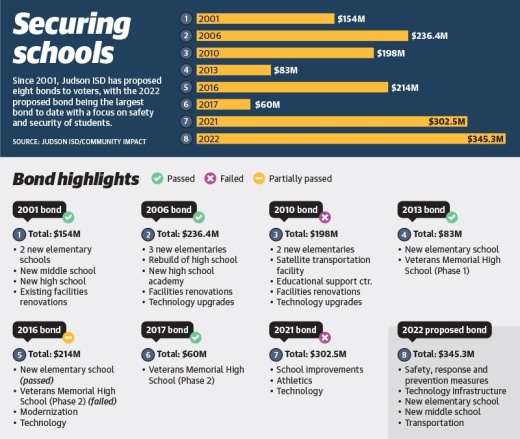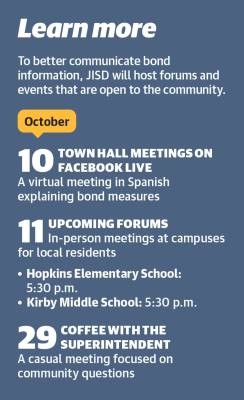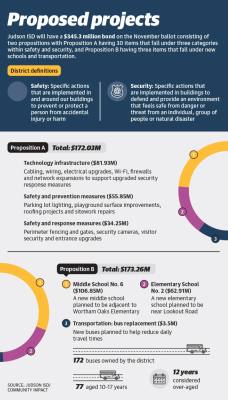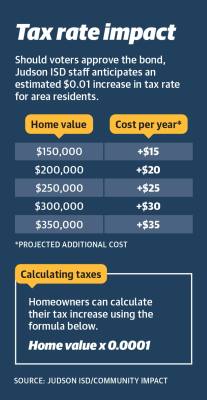This bond has been in discussion since the school shooting at Robb Elementary School in Uvalde on May 24, in which 19 students and two teachers were killed.
Board discussions began in June, and trustees decided a bond would be necessary to ensure safety and security across the district, and help prevent any instances that may be a threat to students and staff by implementing new equipment in campus buildings.
Trustee José Macias said it is beneficial to have the bond in November so the district can start on projects as soon as possible and not delay security measures for students and staff.
“The intent behind putting a security bond was to have some pretty quick turnaround,” he said. “The emphasis on doing it in November was that we can start early.”
According to JISD staff, the purpose of the bond is to provide the district with the resources to begin safety and security projects.
However, the bond package also includes a new elementary school, middle school and additional buses.
Communications Director Nicole Taguinod said if the bond passes, the goal is to begin the process as soon as possible.
“If the bond passes, our goal is to begin the procurement and bidding processes as soon as possible; no later than January 2023,” Taguinod said. “Projects would need to be completed in phases, so completion would vary by project. The middle school is projected to be completed by fall of 2025.”
Bond measures
The proposed bond consists of Proposition A, which is focused on safety and security, and Proposition B, which is focused on new schools and transportation.
The 30 safety and security projects under Proposition A will affect all 21 schools in the district, Taguinod said.
Projects consist of technology upgrades, safety, response and security.
Taguinod said safety projects are focused on the prevention of accidental harm or injury, and security projects are focused on the response or protection against threats.
“Some of our campuses do not have a security vestibule,” she said. “This means that when a person walks into a building, they can immediately access different parts of the school. Adding security vestibules to campuses is a security project.”
In another project, classified as a safety project due to the health risk for students and staff, some campuses do not have air conditioning in the gyms, and those campuses open large roll-up doors and entrance doors to help ventilate the area.
According to school district staff, adding air conditioning would allow for proper cooling, which keeps students and staff safe from the heat, and it allows for the doors to be closed, which keeps students and staff safe and secure.
With Proposition A focused on safety and security of current campuses in the district, Proposition B is focused on handling issues with overcrowding across the district, according to JISD staff.
New elementary and middle schools under Proposition B will help reduce the use of portable buildings, Taguinod said.
By eliminating the use of portable buildings, students and staff will be more secure as they return to classrooms inside, Superintendent Jeanette Ball said.
“Portables are something that is a little more of a challenge to keep safe,” Ball said.
The new schools are planned for the Veterans Memorial High School feeder area.
Proposition B could also add more buses if approved, which will help reduce travel times and overcrowding.
The district now has 172 buses, with 77 of them between 10 and 17 years old. Buses are considered over-aged at 12 years, according to JISD staff.
Trustee Suzanne Kenoyer said having buses would be a security improvement for students, and some students are having to wait for buses that have double routes.
“There are kids that are waiting to get home,” she said. “We want our students off the campus in an expedient fashion.”
The cost of waiting
The last time the district put forward a bond was in November 2021—a $302.5 million bond with three propositions, all of which failed to pass.
Taguinod said almost all of the safety and security items and Proposition B in the proposed 2022 bond were included in the November 2021 bond.
Ball said the failure of the 2021 bond was a setback for the district, and since then the projected prices of items have only increased.
According to JISD staff, the estimated cost for the new middle school is around $106 million, compared to an estimated cost of $70 million in the failed 2021 bond.
Bill Atkins, assistant superintendent of finance and operations, said inflation and supply chain issues are ongoing, and cost estimates are expected to change.
“Although we cannot predict what increased costs will be if we are able to begin projects, we expect prices to be higher than they are today,” he said.
Ball said the greatest challenge with the 2021 bond process was not effectively communicating bond details to the broader community—something district officials said they hope to remedy this time around.
“Another concern that was brought up was tax rate and ballot language,” Ball said. “We plan to address that by providing more information through different methods—like videos, mailouts and a specific section on our website.”
The cost to residents
Atkins said should the bond pass, the expected tax rate increase would likely take place in the 2024 tax year.
However, the bond package, should it pass, will increase the district’s interest and sinking tax rate by $0.01 beginning next year.
At the same time, the maintenance and operations tax rate will decrease by $0.05 next year, resulting in an overall decrease in the tax rate of $0.04 in 2023.
Despite a decrease in the overall rate, homeowners could still see an increase in taxes due to an increase in home values, according to JISD staff.
The estimated payment schedule is around 25 years for each issuance, and there are estimated to be three issuances depending on economic conditions, according to JISD staff.
However, not all residents may be affected. Atkins said those who qualify for the homestead exemption will not see an increase in rates.
“Under the over 65 homestead exemption, taxes are frozen at the dollar amount of the year the individual turned 65 and regardless of future tax rate increases, the tax levy for the 65-year-old can never escalate beyond the ceiling dollar amount,” Atkins said.
Preparing for the election
To help share bond information, the district will host meetings and opportunities for residents and voters.
“We want to encourage the community to learn more about our bond proposal,” Taguinod said. “Our website, [www.judsonisd.org/bond2022], has a lot of information, and we are continuously adding to it.”
A schedule of community meetings can be found on the district website, and there are plans to have town hall meetings on social media in both English and Spanish.
Meetings will focus on helping voters understand the safety and security aspects of the bond, and answer residents’ questions and concerns.
“The bond proposal will aim to enhance security measures across our district and provide security measures in and around our buildings to ensure safe environmental conditions for students and staff including growth and overcrowding,” Ball said.
Residents 18 and older are encouraged to register to vote and vote in the upcoming election. Early voting begins on Oct. 24.
Whether the bond passes or fails is up to voters, and, Ball said, if the bond fails, the district will have to reprioritize local funds to accommodate needed projects.
“If the bond fails, we would continue to address the needs of the district,” Ball said. “We would need to reprioritize what we can address with our local funds and in what timeline we can accomplish these things. We would seek input and feedback with our community through our Growth and Planning Committee meetings.”








